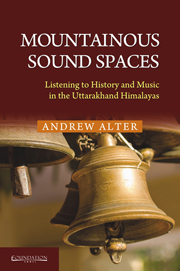Book contents
- Frontmatter
- Contents
- List of Figures
- List of Tables and Musical Examples
- Preface
- Acknowledgements
- Introduction
- 1 Echoes of Colonialism: Bagpipes in the Himalayas
- 2 Echoes of a Royal Heritage: Vestiges of Naubat
- 3 Possession and Performance: Sounding Out the Epic Worlds of Heroes and Gods
- 4 Worlds of Sound: Revisiting the Parameters of Oral Tradition
- 5 Flutes, Sprites and Mountainous Geographies
- 6 Drum Strokes, Syllables and Rhythmic Patterns
- 7 The Significance of Tantric Sects for Drum Practice in the Central Himalayas
- 8 Playing History: Sounding Out the Epic Worlds of Heroes and Gods
- 9 The Legacy of Garhwali Cassettes: Remembering the Pre-digital Age of Music Commodification
- Epilogue: Listening to an Uttarakhandi Himalayan Space
- Bibliography
- Index
3 - Possession and Performance: Sounding Out the Epic Worlds of Heroes and Gods
Published online by Cambridge University Press: 05 October 2014
- Frontmatter
- Contents
- List of Figures
- List of Tables and Musical Examples
- Preface
- Acknowledgements
- Introduction
- 1 Echoes of Colonialism: Bagpipes in the Himalayas
- 2 Echoes of a Royal Heritage: Vestiges of Naubat
- 3 Possession and Performance: Sounding Out the Epic Worlds of Heroes and Gods
- 4 Worlds of Sound: Revisiting the Parameters of Oral Tradition
- 5 Flutes, Sprites and Mountainous Geographies
- 6 Drum Strokes, Syllables and Rhythmic Patterns
- 7 The Significance of Tantric Sects for Drum Practice in the Central Himalayas
- 8 Playing History: Sounding Out the Epic Worlds of Heroes and Gods
- 9 The Legacy of Garhwali Cassettes: Remembering the Pre-digital Age of Music Commodification
- Epilogue: Listening to an Uttarakhandi Himalayan Space
- Bibliography
- Index
Summary
Praise to Narsingh!
Praise to the five named deities!
Praise to Nirankar!
The first king of the Kanturis was Raja Ajaybitha, then Gajebitha, then king Sujana Deb, then Amar Deb, then King Pithaura, then King Prithipal. King Pithima Deb was the father of Dhama Deb whose mother was Muladeyi.
With these words, Bhag Chand, a huṙkiyā (drummer) from the village of Naugaon in Pauri district of Uttarakhand, began to sing the pawāṙā (heroic epic) of ‘Bijula Naik’. I had organized a performance of this specific story in April of 2004 at my own house and a small group of about five people had joined us for the occasion. This chapter explores the dynamics of that performance by focusing on the story of Bijula Naik as well as the performative elements of Bhag Chand's singing and drumming. The sonic realm of a pawāṙā draws one into the world of the characters and transports one regularly between the natural world of the event and the supernatural world of the story.
Bijula Naik is the illicit son of Dhama Deb and Chhamuna Patra, he being the king of the Kanturis, and she being a low caste dancer. Though the story does not provide the details of the illicit affair, the disparity between their castes as well as Chhamuna Patra’s status as a dancer in the king’s court provides an underlying tension that continues throughout the story. To begin the story’s performance, it was essential for Bhag Chand to acknowledge the presence of the world of gods through naming them in advance of his story. His skills as a ritual specialist would be essential in controlling any devtās (deities) who might join us for the performance.
- Type
- Chapter
- Information
- Mountainous Sound SpacesListening to History and Music in the Uttarakhand Himalayas, pp. 29 - 47Publisher: Foundation BooksPrint publication year: 2014

